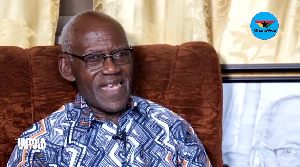- Home - News
- TWI News | TV
- Polls
- Year In Review
- News Archive
- Crime & Punishment
- Politics
- Regional
- Editorial
- Health
- Ghanaians Abroad
- Tabloid
- Africa
- Religion
- Election 2020
- Coronavirus
- News Videos | TV
- Photo Archives
- News Headlines
- Press Release
General News of Wednesday, 13 March 2013
Source: dailyguideghana.com
GH¢1.13bn for district assemblies
AN AMOUNT of GH¢1.13 billion has been earmarked for Metropolitan, Municipal and District Assemblies (MMDAs) for development projects 2013 if approved by Cabinet and Parliament, Administrator of the District Assemblies Common Fund (DACF) Kojo Fynn has hinted.
The DACF administrator disclosed this at a two-day workshop organized by his office for the Parliamentary Press Corps in Sunyani, in the Brong Ahafo Region on the theme, “Utilization of the Common Fund, a catalyst for national development.”
The workshop was also attended by Members of Parliament (MPs) in the Brong Ahafo Region, MMDA officials as well as traditional and some opinion leaders in the region.
According to Mr. Fynn, GH¢1.13 billion was based on 7.5 percent of the total revenue generated in the year 2012, which should be disbursed into the DACF this year for onward release to all the 216 MMDAs.
He indicated that GH¢319 million out of the total amount would be channelled into Priority Intervention Programmes (PIPs) such as the National Youth Employment Programme (NYEP), Sanitation and Water Management, School Feeding Programme among others.
An amount of GH¢635,987,239.66, he pointed out, was disbursed into the fund, observing that that this year’s amount was a substantial increase in the amount disbursed last year.
Mr. Fyn called for the allocation of a portion of the revenues generated from the oil and gas sector into the DACF.
The oil and gas had become part of the revenue generating sectors of the economy and that it would be imperative to allocate some amount from the sector to the DACF so that communities could have direct benefits from the oil and gas sector.
He explained that when the DACF 1993 Act 455 was established two decades ago, the country did not have an oil and gas industry to generate revenue from.
Mr. Fyn expressed concerns over the untimely delays in the disbursement of the fund, bemoaning “this, obviously, is a major drawback on the Assemblies’ development effort as most of the MMDAs depend on DACF for their development projects and service delivery”.
“The current system of allowing all government revenues to be paid into the Consolidated Fund before statutory payments are made is a major source of the delay in the release of the Common Fund”.
The DACF) administrator descended heavily on the MMDAs, attributing developmental deficit in the country to the misuse of the DACF by Chief Executives of these assemblies.
He regretted that the DACF, which was established to finance capital intensive projects in the municipal and district assemblies, were rather being used for recurrent expenditure or payment of salaries abandoning developmental projects in the process.
Mr. Fynn said the communities would not be as deprived as they were now if Chief Executives of MMDAs used the funds allocated to them by the government for the intended purposes.
He proposed a review of the law establishing the DACF by the Legislature so that a cap could be placed on the quantum of the fund allocated for recurrent expenditure of the assemblies.
This, he maintained, could free more funds for developmental projects in districts and communities.
He advised chief executives of MMDAs to endeavour to generate more funds internally so that they could use those funds for running their offices.
General Manager for Newspaper Publications at the Graphic Communications Group Ltd, Yaw Boadu Ayeboafo, entreated the media to be interested in the disbursement of the common fund by closely monitoring the process.
Speaking on the topic, “Media’s responsibility in ensuring accountability and transparency in the utilization of DACF” the former editor of Graphic Communications Group indicated that the media had a duty and responsibility to stick to their ethical values and help in the course of eliminating corruption from the DACF.
“The media can make meaningful impact when they uphold professionalism,” Mr. Ayeboafo reiterated admonishing the media not to distort or give wrong meanings to words when disseminating information on the fund.
The media, he maintained, played an important role in eliminating corruption in the country, cautioning journalists not to engage in corruption so that they would in a better position to effectively fight the canker.










